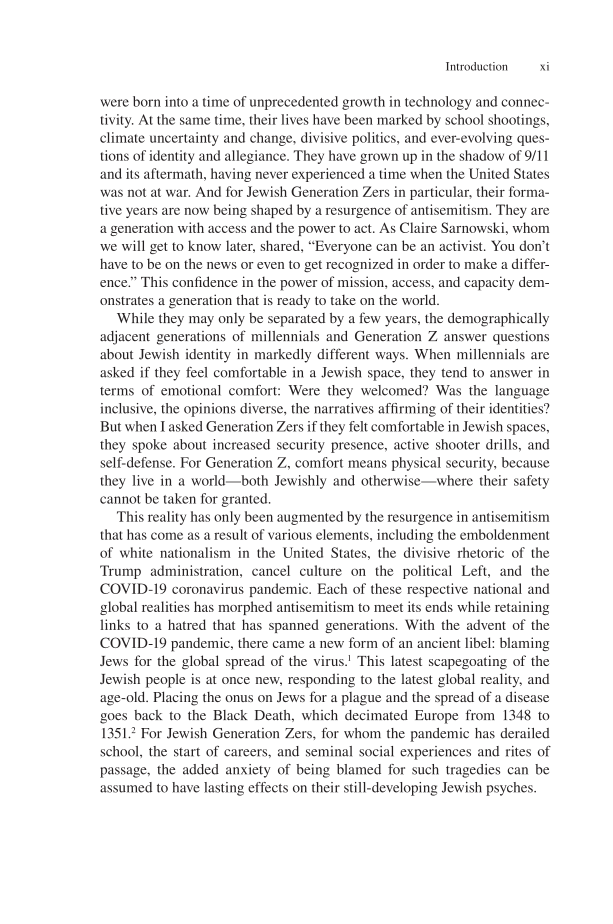Introduction xi were born into a time of unprecedented growth in technology and connec- tivity. At the same time, their lives have been marked by school shootings, climate uncertainty and change, divisive politics, and ever-evolving ques- tions of identity and allegiance. They have grown up in the shadow of 9/11 and its aftermath, having never experienced a time when the United States was not at war. And for Jewish Generation Zers in particular, their forma- tive years are now being shaped by a resurgence of antisemitism. They are a generation with access and the power to act. As Claire Sarnowski, whom we will get to know later, shared, “Everyone can be an activist. You don’t have to be on the news or even to get recognized in order to make a differ- ence.” This confidence in the power of mission, access, and capacity dem- onstrates a generation that is ready to take on the world. While they may only be separated by a few years, the demographically adjacent generations of millennials and Generation Z answer questions about Jewish identity in markedly different ways. When millennials are asked if they feel comfortable in a Jewish space, they tend to answer in terms of emotional comfort: Were they welcomed? Was the language inclusive, the opinions diverse, the narratives affirming of their identities? But when I asked Generation Zers if they felt comfortable in Jewish spaces, they spoke about increased security presence, active shooter drills, and self-defense. For Generation Z, comfort means physical security, because they live in a world—both Jewishly and otherwise—where their safety cannot be taken for granted. This reality has only been augmented by the resurgence in antisemitism that has come as a result of various elements, including the emboldenment of white nationalism in the United States, the divisive rhetoric of the Trump administration, cancel culture on the political Left, and the COVID-19 coronavirus pandemic. Each of these respective national and global realities has morphed antisemitism to meet its ends while retaining links to a hatred that has spanned generations. With the advent of the COVID-19 pandemic, there came a new form of an ancient libel: blaming Jews for the global spread of the virus.1 This latest scapegoating of the Jewish people is at once new, responding to the latest global reality, and age-old. Placing the onus on Jews for a plague and the spread of a disease goes back to the Black Death, which decimated Europe from 1348 to 1351.2 For Jewish Generation Zers, for whom the pandemic has derailed school, the start of careers, and seminal social experiences and rites of passage, the added anxiety of being blamed for such tragedies can be assumed to have lasting effects on their still-developing Jewish psyches.
Document Details My Account Print multiple pages
Print
You have printed 0 times in the last 24 hours.
Your print count will reset on at .
You may print 0 more time(s) before then.
You may print a maximum of 0 pages at a time.

































































































































































































